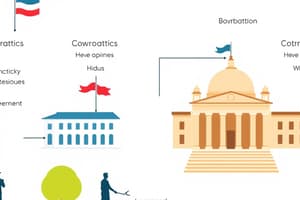Podcast
Questions and Answers
A political system where power is passed on through one family is known as a ______.
A political system where power is passed on through one family is known as a ______.
Monarchy
In a ______ monarchy, elected officials perform the actual governing tasks while the royal family remains the symbolic head of state.
In a ______ monarchy, elected officials perform the actual governing tasks while the royal family remains the symbolic head of state.
constitutional
A system where a family or clan maintains power for many generations is known as a ______.
A system where a family or clan maintains power for many generations is known as a ______.
political dynasty
A political system in which citizens periodically choose their government officials is called a ______.
A political system in which citizens periodically choose their government officials is called a ______.
The political system that does not permit citizen participation in government decisions is referred to as ______.
The political system that does not permit citizen participation in government decisions is referred to as ______.
An institution that is responsible for making and enforcing the rules of a society is referred to as a ______.
An institution that is responsible for making and enforcing the rules of a society is referred to as a ______.
A political system with total control over nearly all aspects of citizens' lives is known as ______.
A political system with total control over nearly all aspects of citizens' lives is known as ______.
Political kinship relates to individuals or families who have a ______ affiliation with one another.
Political kinship relates to individuals or families who have a ______ affiliation with one another.
In a governance system, a body must be recognized by the people it intends to ______.
In a governance system, a body must be recognized by the people it intends to ______.
Power that is legitimized according to tradition is categorized as ______ authority.
Power that is legitimized according to tradition is categorized as ______ authority.
The term ______ refers to political relationships that may extend beyond traditional kinship ties.
The term ______ refers to political relationships that may extend beyond traditional kinship ties.
Power that is granted based on the legal qualifications for a position is known as ______ legal authority.
Power that is granted based on the legal qualifications for a position is known as ______ legal authority.
Legitimacy refers to the right of leaders to govern based on societal ______.
Legitimacy refers to the right of leaders to govern based on societal ______.
The hierarchical system of relationships maintained in a political dynasty is known for its ______ succession.
The hierarchical system of relationships maintained in a political dynasty is known for its ______ succession.
______ are influenced by the political affiliations of individuals and families within a community.
______ are influenced by the political affiliations of individuals and families within a community.
A governing body must balance the satisfaction of the needs of its population while enforcing ______.
A governing body must balance the satisfaction of the needs of its population while enforcing ______.
Institutions involved in governance and political affairs are known as ______ institutions.
Institutions involved in governance and political affairs are known as ______ institutions.
A network of relatives within which individuals have certain mutual rights and obligations is referred to as ______.
A network of relatives within which individuals have certain mutual rights and obligations is referred to as ______.
The law that dictates that a partner must be selected from one's own social group is known as ______.
The law that dictates that a partner must be selected from one's own social group is known as ______.
Children are categorized as members of all ancestors in a ______ descent system.
Children are categorized as members of all ancestors in a ______ descent system.
Affinity refers to kinship by ______, establishing relations through marriage.
Affinity refers to kinship by ______, establishing relations through marriage.
The rule which states that a partner must be chosen from a different group is called ______.
The rule which states that a partner must be chosen from a different group is called ______.
Institutions related to health and healthcare fall under the category of ______.
Institutions related to health and healthcare fall under the category of ______.
A socially recognized union between spouses that establishes rights and obligations is known as ______.
A socially recognized union between spouses that establishes rights and obligations is known as ______.
Flashcards are hidden until you start studying
Study Notes
Types of Governments
- Monarchy: A political system where power is passed down through a single family.
- Constitutional Monarchy: The royal family serves as symbolic head of state, but elected officials govern.
- Democracy: Citizens elect officials to govern.
- Authoritarianism: Citizens lack participation in government.
- Totalitarianism: The government tightly controls all aspects of citizens' lives.
Aspects of Politics
- Power: The ability to influence others despite resistance.
- Authority: Legitimate power.
- Types of Authority:
- Traditional: Power legitimized by tradition (e.g., monarchy).
- Charismatic: Power legitimized by charisma (e.g., John F. Kennedy).
- Rational Legal: Power legitimized by qualification for a position (e.g., elected mayor).
- Legitimacy: The right of political leaders to govern based on societal values.
Political Participation
- Individuals and groups influence political decisions.
- Examples:
- Voting: Choosing officials in elections.
- Lobbying: Influencing government officials.
- Campaign/Advocacy: Actions aimed at achieving a specific outcome.
Economic Institutions
- Economy: The system for producing and distributing goods and services.
- Currency: Used for exchange.
- Customs: Shape societies by influencing how goods and services are exchanged and distributed.
Modes of Subsistence
- Food Foraging Societies: Rely on hunting, fishing, and gathering wild plants.
- Characteristics: Mobility, small groups, equality, communal property, flexible gender-based labor.
- Food Producing Societies: Domesticated plants and animals during the Neolithic Revolution using stone tools.
- Pastoralism: Breeding and managing domesticated grazing animals in challenging environments (dry, cold, steep, rocky).
Forms of Marriage
- Monogamy: One spouse.
- Polygamy: Multiple spouses.
- Polygyny: One man with multiple wives.
- Polyandry: One woman with multiple husbands.
- Group Marriage: Multiple men married to multiple women.
Post-Marital Residency Rules
- Patrilocal: Residence at the husband's father's home.
- Matrilocal: Residence at the wife's mother's home.
- Ambilocal: Choice between patrilocal or matrilocal.
- Neolocal: Establishing a new household.
- Avuncolocal: Residence at the groom's mother's brother's home.
Ritual
- Kinship extends to individuals with religious, economic, or political ties, including friendship.
Compadrinazgo
- Godparenthood Complex: Emphasizes vertical or horizontal relationships.
- Padrinazgo: Spiritual parenthood.
- Compadrazgo: Ritual co-parenthood.
Family
- A group living together as a household, typically parents and children.
Household
- One person living alone or a group sharing living arrangements.
Types of Family
- Nuclear: Husband, wife, and children.
- Extended: Family living with relatives.
- Lone Parent: One parent with children.
- Reconstituted: Two adults with children from previous relationships.
- Transnational: Separated families.
- Same Sex: Family with two parents of the same gender.
- Blended: Family formed from previous relationships.
Political Kinship
- Kinship relations extending to those with political affiliation.
Political Dynasty
- A family or clan holding power for generations through political succession.
Political Institutions
- Government: The institution enforcing societal rules and regulating relations with other societies.
- Must be recognized by the people it governs.
Institutions
- Organizations founded for specific purposes (e.g., religious, educational, social).
- Established laws, practices, or customs.
- Organization, foundation, establishment, institute, center.
Types of Institutions
| Type | Description |
|---|---|
| Kinship | Network of relatives with mutual rights and obligations. |
| Health | Institutions related to health and healthcare. |
| Political | Institutions involved in governance and political affairs. |
| Education | Institutions focused on teaching and learning. |
| Economic | Institutions related to production, distribution, and exchange of goods and services. |
| Religious | Institutions centered around religious beliefs and practices. |
| Non-state | Organizations operating outside of a sovereign state. |
Social Institutions
The Family
Kinship
- Network of relatives with mutual rights and obligations.
Types of Kinship
- Blood: Based on genetic relatedness.
- Marriage: Based on a legal union.
Kinship Patterns
- People related by descent or marriage.
- Descent: Based on genetic relatedness.
- Marriage: Based on a legal union.
Descent
- Bloodline
- Descents
Family Tree Symbols
- Δ Male
- O Female
- Ego Subject of chart
- GrFr Grandfather
- GrMo Grandmother
- Fr Father
- Mo Mother
- Un Uncle
- Au Aunt
- Br Brother
- Z Sister
- Co Cousin
Descent Types
- Unilineal: Children belong to either mother's or father's group.
- Patrilineal: Children belong to the father's group.
- Matrilineal: Children belong to the mother's group.
- Bilateral: Children belong to both parents' ancestral groups.
Marriage
- Affinity: Kinship through marriage.
- Marriage Definition: A recognized union between spouses with rights and obligations.
Types of Marriage
- Endogamy: Selecting a partner from within one's social group.
- Exogamy: Selecting a partner from outside one's social group.
Studying That Suits You
Use AI to generate personalized quizzes and flashcards to suit your learning preferences.




